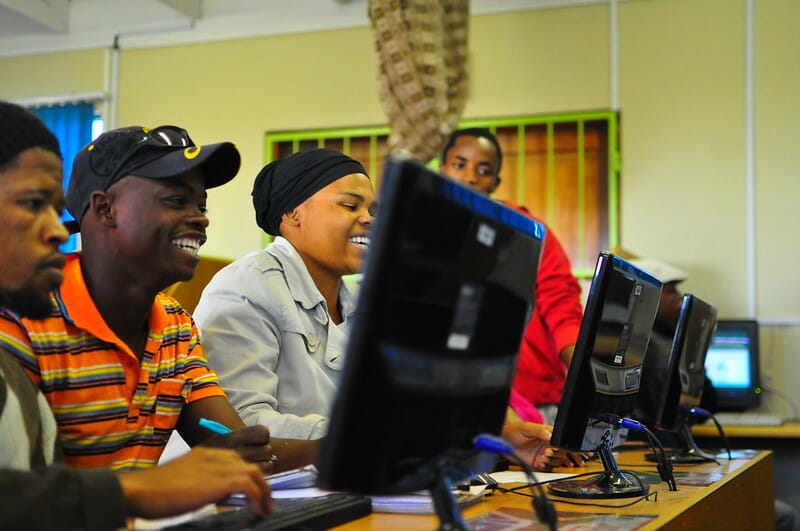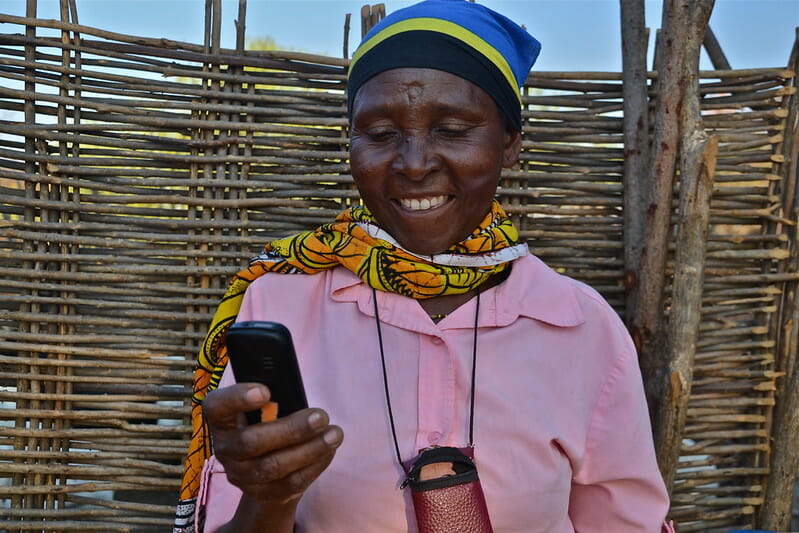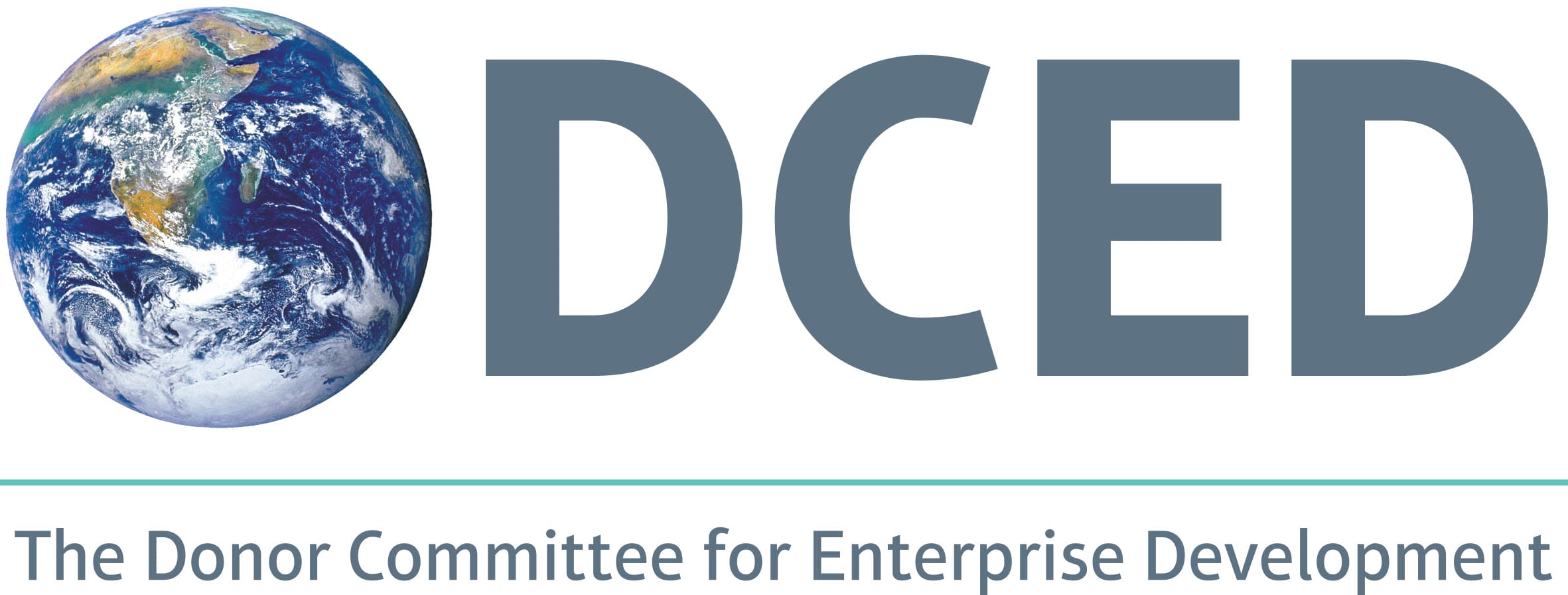Digitalisation is widely recognised as a key force shaping the future of the global economy. Recent experiences highlight both risks and opportunities for PSD practitioners:
- Uptake of digital applications worldwide has accelerated significantly in recent years, giving developing countries a new economic opportunities enabled by digital progress. Indeed, digital technology has already had a transformative development impact, e.g. in the financial sector.
- In other sectors, however, developing countries risk remaining largely passive consumers of digital products and services produced elsewhere. Job creation impacts are still unclear, and the digital divide based on gender, age and geography might grow.
- Harnessing the opportunities and addressing the risks will require additional investments in digital infrastructure, skills and regulatory frameworks and nurturing tech firms and industries that use local knowledge to respond to local needs.
 DCED Synthesis Note
DCED Synthesis Note  External publications
External publications
Summarises key economic development opportunities and risks of digitalisation and how different PSD approaches can be used to address them.
Shaping an environmentally sustainable and inclusive digital future, UNCTAD, 2024
Summarises the key take-aways for environmentally sustainable and inclusive digitalisation strategies from UNCTAD’s 2024 Digital Economy Report.
Highlights key barriers and priority measures for digital technologies to help address some of Africa’s most pressing development challenges.
Global reviews
- A matter of choice: People and possibilities in the age of AI, Human Development Report, UNDP, 2025
- Measuring Digital Development: Facts and Figures – Focus on Landlocked Developing Countries, ITU, 2025
- Regulating the Digital Economy in Africa: Managing Old and New Risks to Economic Governance and Inclusive Opportunities, World Bank, 2024
- Digital Trends and Progress report, World Bank, 2023
- Platform Work in Developing Economies: Can Digitalisation drive Structural Transformation?, ILO, 2023
- Aligning Digital and Industrial Policy to Foster Future Industrialisation, UNIDO, 2023
- Bridging the Technological Divide: Technology Adoption by Firms in Developing Countries, World Bank, 2022
- Small Goes Digital: How digitalization can bring about productive growth for micro and small enterprises, ILO, 2021
- Shaping a Just Digital Transformation, OECD Development Co-operation Report, 2021
- Industrial Development Report: Industrialisation in the digital age, UNIDO, 2020
- The Future of Work in Africa : Harnessing the Potential of Digital Technologies for All, Africa Development Forum, 2020
- A Roadmap towards a Common Framework for Measuring the Digital Economy, OECD, 2020
Country, region and sector case studies
- State of Digital Development and Trends in the Africa Region: Challenges and Opportunities, ITU, 2025
- Digital Opportunities in African Businesses, IFC, 2024
- The Mobile Economy in Sub-Saharan Africa, GSMA, 2024
- Global Digitalization Index, Huawei, 2024
- Driving Digital Transformation of African Economies: Evidence and methodology, GSMA, 2024
- AI and the Future of Work in Asia, Tony Blair Institute for Global Change, 2024
- African Start-ups that Use Disruptive Tech Do Better, IFC, 2024
- The Digital Economy for Africa Initiative, World Bank
- Digital Transformation for Quality Jobs, African Union & OECD, 2021
- Strengthening Youth Livelihoods and Enterprise Innovation in Africa’s Digital Era, ODI, 2021
- Digital Commerce and Youth Employment in Africa, MCF, 2019
- Africa Marketplace Explorer, ITC
- Latin America and Caribbean Marketplace Explorer, ITC
- The Digital Transformation Strategy for Africa 2020 – 2030, African Union

Cross-cutting tools and guides
- Measuring Digital Development – ICT Development Index 2025, ITU, 2025
- Harnessing the Private Sector for Better Development Data, World Bank, 2025
- Digital Skills Toolkit, ITU, 2024
- Principles for Digital Development (updated), 2024
- Reaching the Potential for the Digital Economy in Africa: Digital Tools for Better Governance, World Bank, 2023
- #Digital4MSME: How to use the market systems approach for digital transformation, GIZ & DCED/BEAM, 2021
- Digital Economy Kit – Harnessing Digital Technologies for Inclusive Growth, Pathways for Prosperity Commission, 2020
- Digital Inclusion Benchmark, World Benchmarking Alliance, 2020
- Toolkit 2.0 – Digitalisation in Development Cooperation, GIZ, 2019
- Measuring the Digital Economy, IMF, 2018
- Digital Adoption Index: Measuring the Global Spread of Digital Technologies, World Bank, 2016
- An enabling environment for the digital transformation of the economy, DCED, 2025
- Competition Policy in Digital Markets in Africa, World Bank, 2024
- Taxes and Parafiscal Fees on Digital Infrastructure Services in Africa, World Bank, 2024
- Vulnerabilities of ICT Procurement to Fraud and Corruption, World Bank, 2023
- Use of New Technologies in Regulatory Delivery, DCED, 2020
- Digitalisation in Sub-Saharan Africa, IMF, 2020
- Digitalisation and Responsible Business Conduct: Stocktaking of policies and initiatives, OECD, 2020
- Which Policies and Regulations can help advance Digitalization?, UN Broadband Commission, 2017
- Women and Digital Pathways, UNDP, 2025
- The Mobile Gender Gap Report, GSMA, 2024
- The effects of automation in the apparel and footwear industries and their gender dimensions: Indonesia case study, ILO, 2024
- Leveraging Digital Technologies to Advance Women’s Economic Empowerment, CSIS, 2024
- Putting Women and Girls at the Centre of Digital Development, World Bank, 2021
- GenderTech Toolkit: Building digital solutions for, with, and by girls, UNICEF
- Measuring and Understanding Gender Inequalities in Digital Access, University of Oxford
- Scaling Renewables in the AI Era: How Emerging Economies Can Scale the Energy Transition, Tony Blair Institute for Global Change, 2025
- Rethinking Mobile Phones: The Business Case for Circularity, GSMA, 2025
- Green Digital Transformation: How Sustainably Close the Digital Divide and Harness Digital Tools for Climate Action, World Bank, 2023
- Digital for Climate, World Bank
- Green Data Centers: Towards a Sustainable Digital Transformation, World Bank, 2023
- Beyond the AI Divide: A Simple Approach to Identifying Global and Local Overperformers in AI Preparedness, World Bank, 2025
- Powering AI in the Global South, Tony Blair Institute for Global CHange, 2024
- Mind the AI Divide: Shaping a Global Perspective on the Future of Work, UN and ILO, 2024
- Bridging the AI Divide: Empowering Developing Countries through Manufacturing, UNIDO, 2024
- Tipping the Scales: AI’s Dual Impact on Developing Nations, World Bank, 2024
- Three Reasons Why AI May Widen Global Inequalities, CDS, 2024
- From Fields to Markets: The Role of Digital Platforms in West Africa’s Agricultural Success, World Bank, 2024
- Harnessing the Benefits of Digital Agriculture for Smallholder Farmers in East Africa, CEPR, 2024
- Enabling Digitalisation for Food and Agriculture in the Commonwealth, The Commonwealth, 2022
- The Digitalisation of African Agriculture Report, 2018-2019, CTA, 2019
- Digital Technologies in Agriculture and Rural Areas, FAO, 2019



- Digital Strategy 2020-2024, USAID, 2020
- Donor Support to the Digital Economy in Developing Countries, UNCTAD, 2019
- Digital Agenda for Foreign Trade and Development Cooperation (BHOS), Netherlands Ministry of Foreign Affairs, 2019
- Digital Strategy (in German), BMZ, 2019
- Digital Strategy 2018-2020: Doing Development in a Digital World, DFID, 2018
- Roadmap to the digital future, GIZ, 2018
- Digital strategy for Norwegian development policy, Norwegian Ministry of Foreign Affairs, 2018
- Digital4Development: mainstreaming digital technologies and services into EU Development Policy, European Commission, 2017
- Hack the Future of Development Aid, Ministry of Foreign Affairs Denmark, 2017
- ‘Digital for Development’ for the Belgian Development Cooperation, 2016
Photo credits: Hendri Lombard/World Bank; erict19/flickr.com; Beyond Access, South Africa/ flickr.com C. Schubert/ flickr.com
